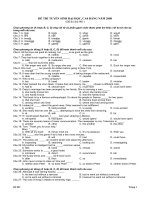Tieng Anh CDDH
Bạn đang xem bản rút gọn của tài liệu. Xem và tải ngay bản đầy đủ của tài liệu tại đây (225.02 KB, 30 trang )
PRIMARY
STUDENTS W ITH
SPECIAL NEEDS
GROUP 9
1. Social
pariticipati
on
2. The
ages
1. SOCIAL PARITICIPATION
• The outcomes of the study
revealed that the majority of
students with special needs have
a satisfactory degree of social
participation.
1. SOCIAL PARITICIPATION
The focus lies
on four key
themes
related
to
social
participation
1.1. FRIENDSHIP
1.2. INTERACTIONS
• This theme addresses how well students communicate
with one another in class.
• Classes where students have opportunities to
communicate
with each other help students
effectively construct their knowledge.
• By emphasizing the collaborative and cooperative nature
of scientific work, students share responsibility for
learning
with
each
other,
discuss
divergent
understandings, and shape the direction of the class.
1.2. INTERACTIONS
• Classes that have low interaction among students
are more lecture-focused, often well-organized, and
tend to present material clearly, with minimal text
and well-chosen images.
• In contrast, a more student-focused class provides
multiple opportunities for students to discuss ideas
in small groups and may support a whole class
discussion.
1.3. STUDENT’S SELF –
CONCEPT
Self-concept is one of the significant psychological
concepts for many of the developmental, clinical,
social, and specifically educational outputs, it is in the
common sense the positive self - concept may
contribute positively in enhancing the academic
achievement level, as it consisted of two elements,
descriptive and evaluative
1.3. STUDENT’S SELF –
CONCEPT
Developmental studies suggest that self-concept
emerged as a result of cognitive and social
development, it consists of information related to
self cognition which is a means used by the
individual to interpret and understand his
experiences and behaviors.
1.3. STUDENT’S SELF –
CONCEPT
Achieving the effective functional performance
includes the positive perception of the individual for
himself, and due to the huge amount of experience
gained in school, the academic achievement and
school are considered the most important factors
affecting
the
individual's
perceptions
and
realizations of himself (Hunt, 1997)
1.4. ACCEPTANCE BY CLASSMATES
• Acceptance of classmates helps
students to be sociable, confident
2. THE AGES
2.1. ABOUT SIX
2.1. ABOUT SIX
2.1. ABOUT SIX
2.1. ABOUT SIX
Encouragement, ample praise, warmth, and great
patience from adults.
Speci
al
Need
s
Ample opportunity for activity of many kinds,
especially for use of large muscles
Wise supervision with minimum
interference.
Friends-by end of period, a best friend.
Some responsibilities, but without pressure and without
being required to make complicated decisions or achieve
rigidly set standards.
Help in developing acceptable manners and habits.
2.2 ABOUT SEVEN
2.2. ABOUT SEVEN
2.2. ABOUT SEVEN
2.2. ABOUT SEVEN
The right combination of independence and
encouraging support.
Speci
al
Need
s
Chances for active participation in learning
situations with concrete objects.
Adult help in adjusting to the rougher
ways of the playground without becoming
too crude or rough.
Warm, encouraging, friendly relationships with
adults.
Acceptance at own level of development.









